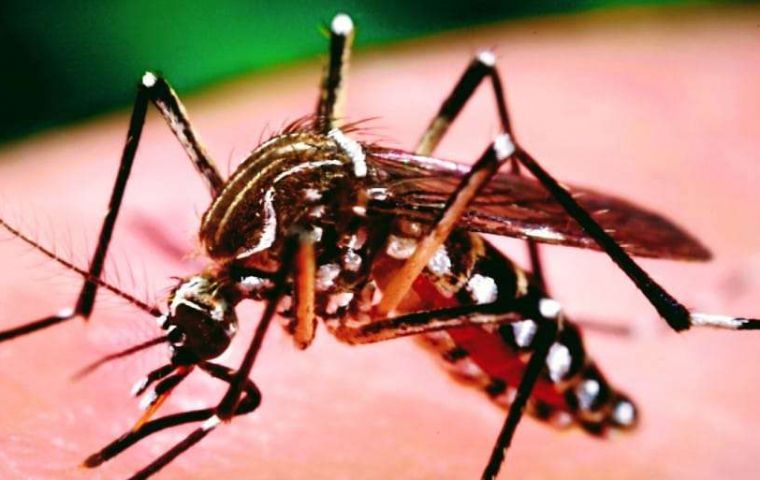MercoPress. South Atlantic News Agency
Argentine university says dengue-carrying mosquito more resistant to insecticides
 The Autonomous City of Buenos Aires (CABA) will start vaccinating adolescents against dengue next week
The Autonomous City of Buenos Aires (CABA) will start vaccinating adolescents against dengue next week A study by the Argentine University of La Plata's Insect Neurobiology Laboratory released this week detected that certain mutations of the dengue-causing aedes aegypti mosquito is more resistant to insecticides than previously thought. The research was focused on the type of insect dominant in the Buenos Aires Metropolitan Area (AMBA) ahead of the Summer season, during which an outbreak of the malady is feared.
The researchers have found three genetic mutations in mosquito 's variant predominant in AMBA, which could render it more resistant to traditional precaution methods. In addition, weather conditions resulting from the La Niña phenomenon could reduce rainfall, it was also explained. The aedes aegypti mosquito easily adapts to changing environments.
In this scenario, experts pointed out that these insects have shown high “resistance to pyrethroid insecticides,” the only type of insecticides available in the province of Buenos Aires, “which could make mosquito control difficult in the short term,” Biologist Sheila Ons told TN.
These chemicals, which are the only ones allowed by the Federal sanitary agency ANMAT, work on a key protein in the insects' nervous system, known as the sodium channel. New mosquito mutations interfere with the mechanism, thus reducing the power of insecticides of which now higher doses are needed.
“Constant spraying increases selection pressure on mosquito populations, promoting the spread of resistant variants,” the experts noted. It is believed that, with the reduction of pyrethroid use, mosquitoes could become susceptible again to insecticides and repellents.
Until 5 years ago there was only 1 variation of the mosquito but today there are three thanks to random mutations, it was also pointed out. Hence, fighting them is more complex both in nature and in volume, since there are also quite a few more of them.
Scientists have also recommended Argentines to start spraying with chemicals the surfaces and areas where breeding sites can develop. They also insisted on the importance of constant visual reviews of these places. In addition, people should empty all containers that accumulate water, such as flower pots, buckets and bottles and use repellents regularly, especially after swimming or sweating, in addition to preferring long-sleeve clothing.
Authorities in the Autonomous City of Buenos Aires have started granting appointments for people interested in getting the Q-Denga dengue vaccine. The campaign will start on Sept. 30 and will first target adolescents aged 15 to 19 as per the advise of the National Commission of Immunizations (CoNaIn). At a later stage, people aged 20 to 29 and then 30 to 39 will be given the chance to receive the two-dose treatment. The immunizer is not recommended for children under the age of 4 or adults aged 60 or over.




Top Comments
Disclaimer & comment rulesCommenting for this story is now closed.
If you have a Facebook account, become a fan and comment on our Facebook Page!